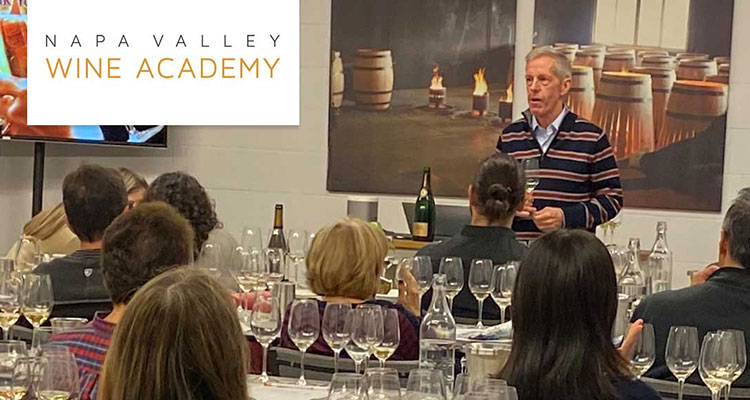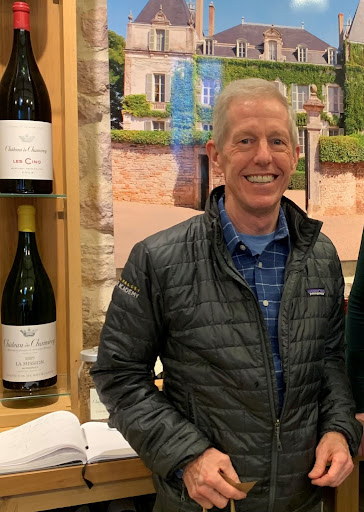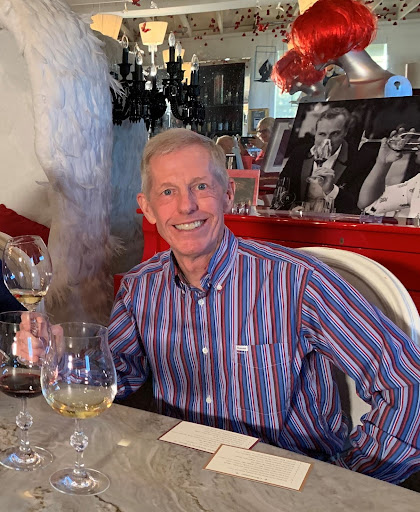Early Bird
Deadline
January 31, 2026
Judging
Date
May 18, 2026
Winners
Announced
June 10, 2026

Peter Marks is a world-renowned wine industry professional with over 40 years of experience in the wine world. As Vice President and Partner of Napa Valley Wine Academy, Peter has curated some of the best wine courses and groomed many aspiring wine enthusiasts, and put them out into the world.
Marks serves on the Institute of Masters of Wine's Education and Exam Board, is the Panel Chair of the Institute of Masters of Wine's Practical (Tasting) Exam, and judges multiple global wine competitions. He is also a member of the Society of Wine Educators and volunteers at a number of philanthropic events all year round.
Apart from all the work that he does, Marks also enjoys riding his bike around the Napa Valley, among the picturesque vineyards.
In conversation with Peter Marks where he walks us through his journey into the wine world.
My interest in wine started with my father who was friends with the original owners of Mayacamas and Chalone wineries and I was privileged to visit those properties and taste many fantastic wines. Then I went to UC Davis to study food and nutrition, but my roommate was a viticulture and enology major, and I fed off his interest and career in wine. My roomie was Rob Davis who recently retired after 40+ years of being the winemaker at Jordan Vineyards & Winery. After graduation, I worked in the food hospitality and restaurant business for 5 years, but I finally surrendered to my growing interest in wine, and starting in 1981 I spent the next 20 years in wine retail. This was in the early years of the growing California wine boom and the timing was pretty good for job security.
As I mentioned, I started in wine retail in 1981 working for a few years with a couple of large discount wine retail chains and working my way up to a store manager. When I heard Draeger’s was looking to hire a new wine steward, I jumped at the opportunity and was hired by Tony Draeger after I was able to recite all the First Growths of Bordeaux. Thankfully, he didn’t ask me to name all the Second Growths! I learned so much from Tony and worked at Draeger’s for 15 years that I still consider it some of the best years of my career. During my time there, we grew from one store to three, opened tasting rooms in the stores, hosted wine dinners, taught wine classes, and even took our customers on wine trips to Burgundy and Bordeaux. Not too many grocery stores, let alone wine shops, were doing this at the time. The Draeger’s were also very kindly supportive of me pursuing the Master of Wine which I passed in 1995. At the end of 1999 came an incredible offer from Peter Granoff MS to join the wine buying team at wine.com who was the largest online retailer at the time. With this position I moved to Napa in early 2000, but not a year later after the dot com market crash, the company folded, and I was out of a job. However, again thanks to Tony Draeger, he gave my name to Michael Mondavi as the Mondavi family was looking for someone to run their wine programs at Copia: The American Center for Wine, Food & the Arts. I did an interview with Robert Mondavi for the Copia job just two days after being laid off from wine.com and was lucky to be hired before I had to go on unemployment. I spent the next seven years at the not-for-profit Copia organizing daily wine programs and special wine events, creating a private wine label, and offering the Wine & Spirit Education Trust (WSET) programs. We became the first to offer the WSET Diploma on the West Coast. In early 2008, one of my former colleagues at wine.com offered me to be the Vice President of Education at Constellation Brands, and for the next 11 years, I helped design and offer wine education programs (including the WSET) to our employees, distributors, and many of our key accounts. Then, after 38 years of working for a family-owned business, a non-profit and a Fortune 500 company, the only thing left was to work for myself. I joined the Napa Valley Wine Academy (NVWA) in 2019 as a partner where I currently teach part-time, and I also do my own wine consulting and education in my spare time.
First and foremost, we look to fill a void where something is not being offered elsewhere, or where we can do a much better job. For example, at the NVWA we have greatly expanded our online WSET programs and included wine kits since the pandemic has forced many of us to work and study from home. I also helped create the American Wine Expert course because no one else offers such a program. We also want to make sure our courses are fun and engaging, and thanks to a great team of designers and educators, we have been very successful in this regard.

Source: WSET Peter Marks delivering a class at Napa Valley Wine Academy
Since we have a variety of courses, the sky is the limit when it comes to taking the next step in one’s wine career. We have courses on the wine business if one wants to start their own winery or work in marketing or with a distributor. We have wine service and sommelier courses if one wishes to work in a restaurant. And completing the WSET Diploma course can lead to almost any type of wine job as well as pursuing the Master of Wine title.
As I mentioned, we were well-positioned when the pandemic hit in March 2019 because that, fortunately, coincided with the launch of our wine kits. As a nimble organization, we quickly ramped up our online WSET courses and created many new proprietary online courses to meet the demand. To be honest, we didn’t have too much trouble procuring the wines that we needed for our classes, although we did see price increases, especially from Europe before the wine tariffs were lifted.
It's different for everyone, but I believe you need to be disciplined, organized, and determined. Of course, having a great depth of knowledge in all areas of wine (viticulture, vinification, maturation, handling, transportation, wine business, and contemporary issues) plus having tasted a wide variety of wines and wine styles from around the world is essential. But then, one must take this knowledge and be able to use critical thinking to answer the theory and tasting questions on the exam. One should also expect to spend a minimum of $5,000 or more a year on course fees and there is a minimum of 2 years of study before one can sit for the exam. On top of that, you need to add travel expenses and the cost of wine samples. Fortunately, there are a number of scholarships available that can be found here.

Source: Peter Marks in Burgundy
I am the chair of the practical (tasting) Stage Two exam and oversee a team of 15 examiners. The practical exam has 3 tasting papers, and each paper has a Paper Chair and 4 Examiners. We begin to formulate questions and consider wine options in December for the following year’s exam. In January and February, each team tastes through potential exam wines checking for typicity and the quality level the team seeks to display. Then in March, we meet to finalize the wines and questions for all 3 papers. Afterward, the wines are sourced, collated, and sent to the exam centers. In the MW exam, every candidate will therefore be tasting wines bought at the same time and in the same place. Following the MW exam, the MW examiners who set a particular paper then separately mark the scripts relating to that paper. They then send their results to the paper and panel chair for moderation. The practical panel chair moderates any marking discrepancies between examiners. The practical panel chair’s moderated results are then sent to the overall chief examiner, who checks the results. We never know who the candidates are because they are identified only by a number. All examiners and I taste the wines on exam days at one of the exam venues, so we know how the wines are showing on the day of the exam and we take that into consideration when marking the papers.
Honestly, my palate was never better than during the week when I sat for the exam because I had tasted exhaustively for many months prior. As a former distance runner, I can tell you that one can get out of shape quickly if you don’t keep practicing, however teaching wine classes, attending wine seminars, and organizing wines for the MW exam help to keep my palate alive. There is no substitute for tasting often and widely. I often refer people to Malcolm Gladwell’s book Outliers where he contends that to become a high achiever in your field you must spend 10,000 hours practicing. This book came out more than a decade after I passed the MW, but I did a calculation based upon my wine buying days at Draeger’s and realized I had spent more than 10,000 hours tasting wines by the time I sat for the exam. To be successful in the MW tasting exam you must also have a strong theory background because many of the questions relate to commercial potential, quality, and maturity and not simply identification of the origin and grape variety(ies). The MW tasting exam is essentially a theory exam with a tasting.

Source: Peter Marks at a winery under the Boisset Collection
Before applying to the MW program you should pass the WSET Diploma, or have a degree in viticulture and/or enology, or have achieved at least the CMS Advanced Sommelier level. Then I recommend you visit the MW website and read about the path to becoming an MW. If you happen to know an MW, I would talk to them as well and gain their insight, but keep in mind that everyone’s path is different.
What I often tell people is, the greatest lesson I’ve learned as a Master of Wine is that wine can never truly be mastered. There is always such much to know and the wine industry is constantly evolving. But if you’re passionate about wine, then you’ll enjoy the journey and hopefully taste some delicious wines along the way!
Connect with Peter Marks on Instagram.
Header Image: Peter Marks Facebook
Enter your Wines now and get in front of top Sommeliers, Wine Directors, and On-Premise Wine Buyers of USA.
